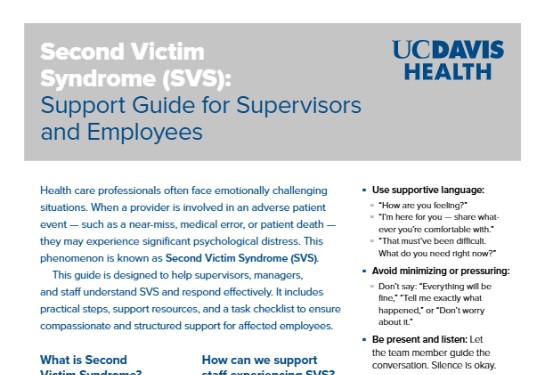Second Victim Syndrome: A guide for managers and supervisors to support staff
When care providers experience trauma, compassionate leadership matters
UC Davis Health has developed a practical guide to help supervisors, managers, and staff understand and respond to Second Victim Syndrome (SVS) – a condition that can affect health care providers following traumatic patient care events.

What is Second Victim Syndrome?
SVS occurs when a health care provider is emotionally or psychologically affected by events such as:
- Near-misses
- Patient deaths
- Medical errors
- Any distressing clinical incident
Common symptoms may include anxiety, intrusive thoughts, regret, difficulty sleeping, and fear of future errors.
How to support staff
The guide outlines a three-tiered support model:
- Immediate emotional support from a trusted colleague or mentor
- Peer support from trained responders (e.g., Support U)
- Professional mental health care through programs like ASAP
This resource includes actionable steps, a task checklist, and links to support services to ensure a structured and empathetic response.
Our hope is that this guide will empower supervisors and managers to guide a struggling employee through the process of seeking psychological support, arranging for time to heal, and humanize the experience so that people who take care of others are given the time and support to able to take care of themselves too.” —Sara Aghamohammadi, M.D., Clinical Professor and Chief Wellness Officer

Take Action
Be the support your team needs.
Download the guide, review it with your leadership team, and keep it accessible. Your awareness and response can make a lasting difference in the well-being of your staff.
Coming in August: Sara Aghamohammadi, clinical professor and chief wellness officer at UC Davis Health, will share more about the guide’s mission and impact in an upcoming leadership message.






